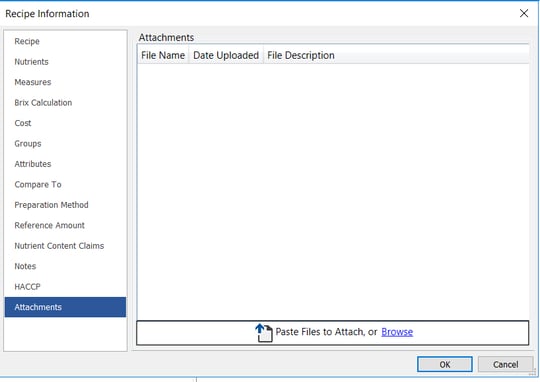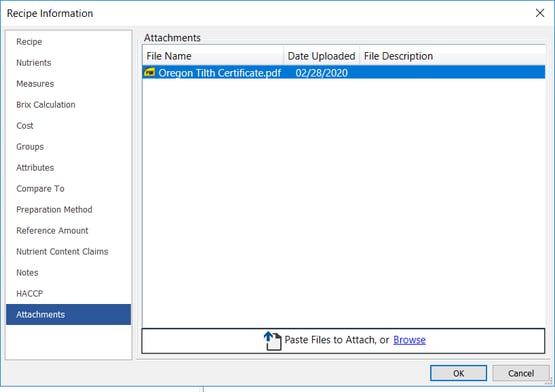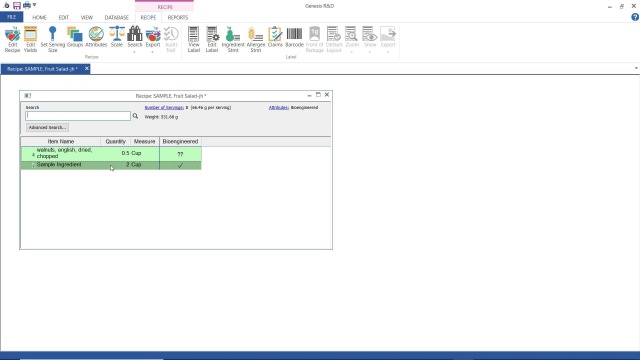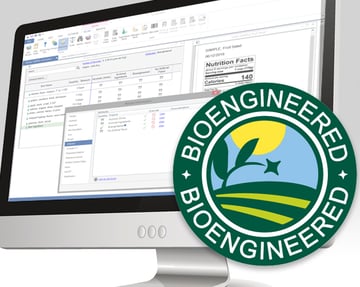The Attributes feature in Genesis R&D® Foods was designed to help users track specific properties in your Ingredients and Recipes in order to comply with mandatory labeling laws and/or for voluntary product claims (vegan, gluten-free, etc.).
Genesis R&D comes with the bioengineered attribute pre-loaded, to help manufacturers comply with the new BE regulations and users can add their own unlimited number and track them on either the recipe or ingredient level. Attributes can be used for marketing claims, packaging declarations, menu organization, and more.
In this blog, we have compiled a list of the top 23 user-created attributes.
There are three primary classifications for your attributes:
- Eligible
- Certified
- Verified
Eligible
When you use the Attribute feature to classify your product as “Eligible,” you’re indicating that the product itself and each of its ingredients meet the requirements of the attribute designation, whether as reported by the supplier or based on the ingredients’ inherent properties. An example of this is rice. Rice is naturally gluten-free and would, therefore, be eligible for a “Gluten-Free” claim. But “Eligible” also indicates that there formal documentation asserting the gluten-free claim.
Certified
When a food product is “Certified” this indicates it has met the requirements as defined by a certification body, and that body has issued a document — generally a certificate — verifying this. Vegan Action is one example. After passing Vegan Action’s certification protocols, which include inspections and lab testing, food products can display Vegan Action’s trademarked “Certified Vegan” logo and the producer will be issued a certificate. When you have a certificate, it’s good practice to attach it electronically to your attribute. Instructions for doing so are at the end of this blog.
Verified
When a product is marked “Verified”, this usually indicates that a lab has tested for a particular attribute. For a food to be verified gluten-free, for example, a lab must verify that the amount of gluten is <20ppm. It is important to attach your lab analysis report to your ingredients or recipes.
23 Most Common User-Added Attributes
- Dairy-Free Eligible
- Dairy-Free Verified
- Gluten-Free Eligible
- Gluten-Free Certified
- Gluten-Free Verified
- Halal Certified
- Halal Eligible
- Keto Eligible
- Keto Certified
- Kosher Certified
- Kosher Eligible
- No Artificial Eligible
- No Artificial Verified
- No Color
- Organic Certified
- Paleo Eligible
- Paleo Certified
- Prop65
- Soy-Free Eligible
- Soy-Free Verified
- Sustainable
- Vegan Certified
- Vegan Eligible
How to Use Each Attribute
Dairy-Free Eligible & Dairy-Free Verified
There is no certifying body that issues certificates for “Dairy-Free” products, so you would use these attributes to signify that products are dairy-free per the ingredients or because you have tested them. The FDA doesn’t have regulations covering “Dairy-Free” on packaging, but you are not allowed to use misleading claims. Some companies also use this term for lactose-free or low-lactose products.
Gluten-Free Eligible, Gluten-Free Certified, & Gluten-Free Verified
If you want to declare your food as “Gluten-Free,” carefully documenting the process is a best practice. The “Gluten-Free” designation is voluntary, but if you choose to use it, please make sure to familiarize yourself with the FDA’s rules.
There are a couple of organizations that will test and certify products as gluten-free, and most labs can test for gluten.
Halal Certified & Halal Eligible
Halal foods are those that are acceptable to eat per Islamic dietary laws. Because the laws cover a wide range of criteria, there are no standard criteria for lab testing. However, there are organizations that will certify foods as halal. Using these attributes will help you should you want to advertise your foods as halal or declare “Halal” on your packaging.
Keto Eligible & Keto Certified
Keto foods are those that are generally low-carb and high-fat. There is no strict universal definition of what “Keto” means, so there aren’t criteria for testing. There are, however, organizations that have defined “Keto” and will certify qualifying foods that meet the criteria. You could use “Keto Eligible” for foods that meet the definition of the certifying bodies or per your in-house definitions.
Kosher Certified & Kosher Eligible
Kosher foods are those that are acceptable to eat per Jewish dietary laws. Again, these laws are so wide-ranging the foods can’t be lab-tested for kosher compliance. But, you can use the “Kosher Eligible” attribute for foods that meet the kosher definition and the “Kosher Certified” to designate foods that have been certified as such by one of the certifying bodies.
No Artificial Flavors Eligible & No Artificial Flavors Verified
Use these attributes for foods that don’t contain any artificial flavors. You can have your lab test for the presence of any.
No Artificial Color
Use this attribute to indicate that your food contains no artificial colors. This is based on ingredient review and individual company protocol.
Organic Certified
There are a few organizations that certify a food product as organic. You will need to pass various tests and inspections to earn certification. You can use certification to earn the “USDA Organic” label, so remember to attach your certificate to this food item in Genesis R&D.
Paleo Eligible & Paleo Certified
Like “Keto,” the definition of “Paleo” doesn’t have a national standard, so what’s eligible will depend on your business’s definition, and the certification will depend on the criteria set forth by the certifying body.
Prop65
Proposition 65 lists chemicals that the state of California has determined to be harmful. If you are marketing a food product in California, you might have to display contaminants on your label, document the contaminants in your products, or keep track of testing.
Soy-Free Eligible & Soy-Free Verified
Some consumers want to avoid soy for reasons other than an allergy. Using eligible and verified attributes lets you keep track of foods that you want to advertise as “Soy-Free.”
Sustainable
This attribute is usually defined by an internal protocol.
Vegan Certified & Vegan Eligible
Foods that are vegan contain no animal products or byproducts. Labs can test for the presence of animal products, so be sure to attach the test results to the product as well. There are some certifying bodies that will issue certification for foods that have passed inspection and testing.
How to Attach a Certificate
- With your Recipe or Ingredient open, click Edit Recipe (or Ingredient).
- Select Attachments.

- Click Browse to search your files.
- Select the file you wish to attach.
- The certificate will now be attached to your Recipe or Ingredient Record.

Watch the tutorial
For a more in-depth lesson on using the Attributes feature in Genesis R&D, watch this tutorial.



7:40
Remember, when you use a claim on your product packaging, labels, or advertising, make sure it complies with the regulations first. Our Consulting Services team offers a claims review and other services.
Other posts you might be interested in
View All Posts
Food Labeling
10 min read
| January 1, 2022
Using the Attributes Feature in Genesis R&D for Tracking BE Material and other Recipe Characteristics
Read More
Trustwell News
9 min read
| December 5, 2024
Q4 2024 FoodLogiQ Updates: Tools to Tackle Today’s FSQA Challenges
Read More
Trustwell News
5 min read
| July 9, 2020

